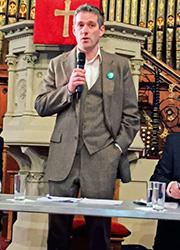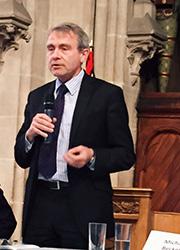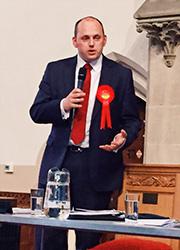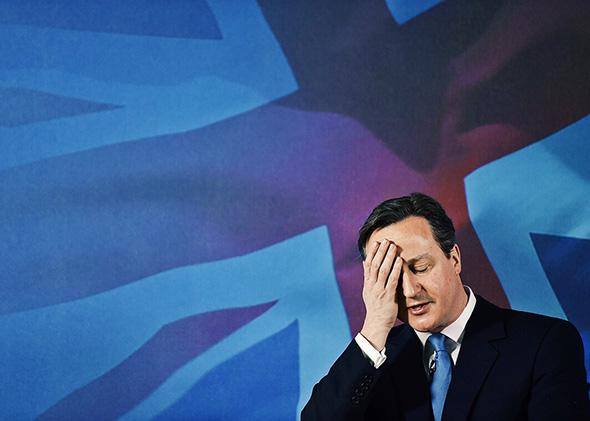SCARBOROUGH, England—On Wednesday night, a British socialist quoted from a Hollywood movie about baseball in the American Midwest: “If you build it, they will come,” said Ian McInnes, the Labour Party candidate for the North Yorkshire constituency of Scarborough and Whitby. The line from Field of Dreams expressed his hopes for what the construction of a multiplex cinema might do for Scarborough’s fading town center, but the sentiment applies just as well to what can happen in a democracy when the range of political options is expanded: If you run, votes might come.
Five candidates—representing the Conservative, Labour, Liberal Democrat, Green, and U.K. Independence parties—answered questions from 150 or so local residents gathered at St. Andrew’s church Wednesday. All were subjected to a fair amount of heckling and grumbling in the two-hour session, but at the end of the evening, the crowd, which initially didn’t seem to favor any particular party, bestowed its most enthusiastic applause on representatives of UKIP and the Greens.

Photo by June Thomas
This particular sampling of British voters seemed heartily sick of the status quo and, consequently, open to new ideas. Of course, it’s easy to espouse bold policies if you don’t have to govern. After three candidates offered predictable responses to a man who asked what they “could do for Scarborough and Scarborough people,” the Greens’ David Malone, who makes TV documentaries about science, took a combative tone available only to candidates who have little chance of winning when he declared the question “ignoble.” He already had a “far better job” than the one he was applying for, he said. He was entering politics because he was worried about his children’s future, not to bring benefits to Scarborough. Then UKIP’s Sam Cross, a local councilor, pointed out that the other parties were “promising you jam tomorrow. Why haven’t Conservatives, Labour, and Liberal Democrats delivered it in the last 18 years? I want to get you that jam.”
All politics is local, but never more so than in Britain. The British House of Commons has 650 MPs for a population of 64.5 million while the U.S. House of Representatives has 435 members for 320 million people. This constituency has 76,000 voters—compared with nearly 370,000 in the House district where I live in Brooklyn. That small size and relative homogeneity don’t bring unanimity, however. At the event in Scarborough, frustrated residents of the seat’s other population center, located less than 20 miles away, repeatedly grumbled, “What about Whitby?”

Photo by June Thomas
The topic that unleashed the most passionate commentary was transportation, especially local train service that is widely perceived to be inadequate and a clogged roadway that residents have been seeking to have widened for decades. Here, once again, the leading parties’ years in power seemed to hurt them. Conservative candidate Robert Goodwill has been the local MP since 2005, and he served as a junior transport minister in the previous government, but for the assembled voters, that achievement represented his biggest failure. A poised and informed speaker, Goodwill’s ability to rattle off investment figures and policy achievements seemed to irritate the crowd. Every boast about increased miles of rail electrification led to vocal complaints about crowded trains; every mention of funding for roadwork set off gripes about slow-moving traffic. Here again, the parties that have never been within sniffing distance of power were able to reel off crowd-pleasing lines, with the Green candidate calling for the renationalization of the railways (“in a privatized world, you don’t control the railways, nor does your MP”), and UKIP using the question as an opportunity to express a rather facile objection to a complicated issue, in this case his party’s opposition to HS2, a controversial rail project that he summarized as “£50 billion to get to Manchester 20 minutes quicker.”

Photo by June Thomas
In this very complicated election, the candidates’ final pitches focused on voting tactically. For McInnes, Labour’s key asset was its potential to beat the Conservatives. He admitted that he agreed with a lot of the values and principles outlined by the Green candidate, but in this constituency, Labour “has a really good chance of winning,” so he asked Green supporters “how it will feel to have voted Green—you’ll feel fantastic … but then you’ll wake up on the following morning with Robert [Goodwill] as your MP and a Conservative government.” Goodwill conjured the specter of the scary Scots—“What happens if we have a Labour government that has to rely on the votes from north of the border to stay in power. We can forget about money going to the A64 [road-widening] or anywhere here in Yorkshire; it’ll be going on the A9 road north of Perth.” Liberal Democrat Michael Beckett said that his party would be a force for moderation on Labour and the Conservatives—not the strongest pitch when the Labour and Conservative candidates both appeared exceedingly moderate—and UKIP’s Cross said he wanted to put Scarborough on the map, a modest ambition that only makes sense if this seat becomes one of UKIP’s few wins.
The Greens’ Malone, on the other hand, put a match to the nearest stick of dynamite: “If your choices are only Tory or Tory Lite, then just carry on voting for one or the other. If those parties and their ideals could make this country better, they’ve had two generations to do it.” His final words encapsulated the whole evening: “We do not believe that a vote for a small party is a wasted vote. We believe it is a chance for change.”
